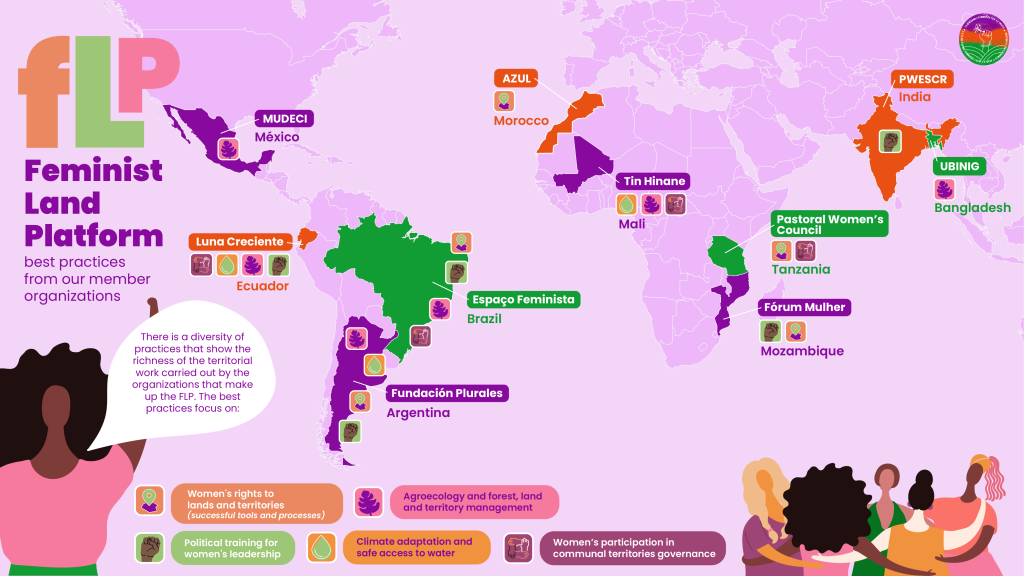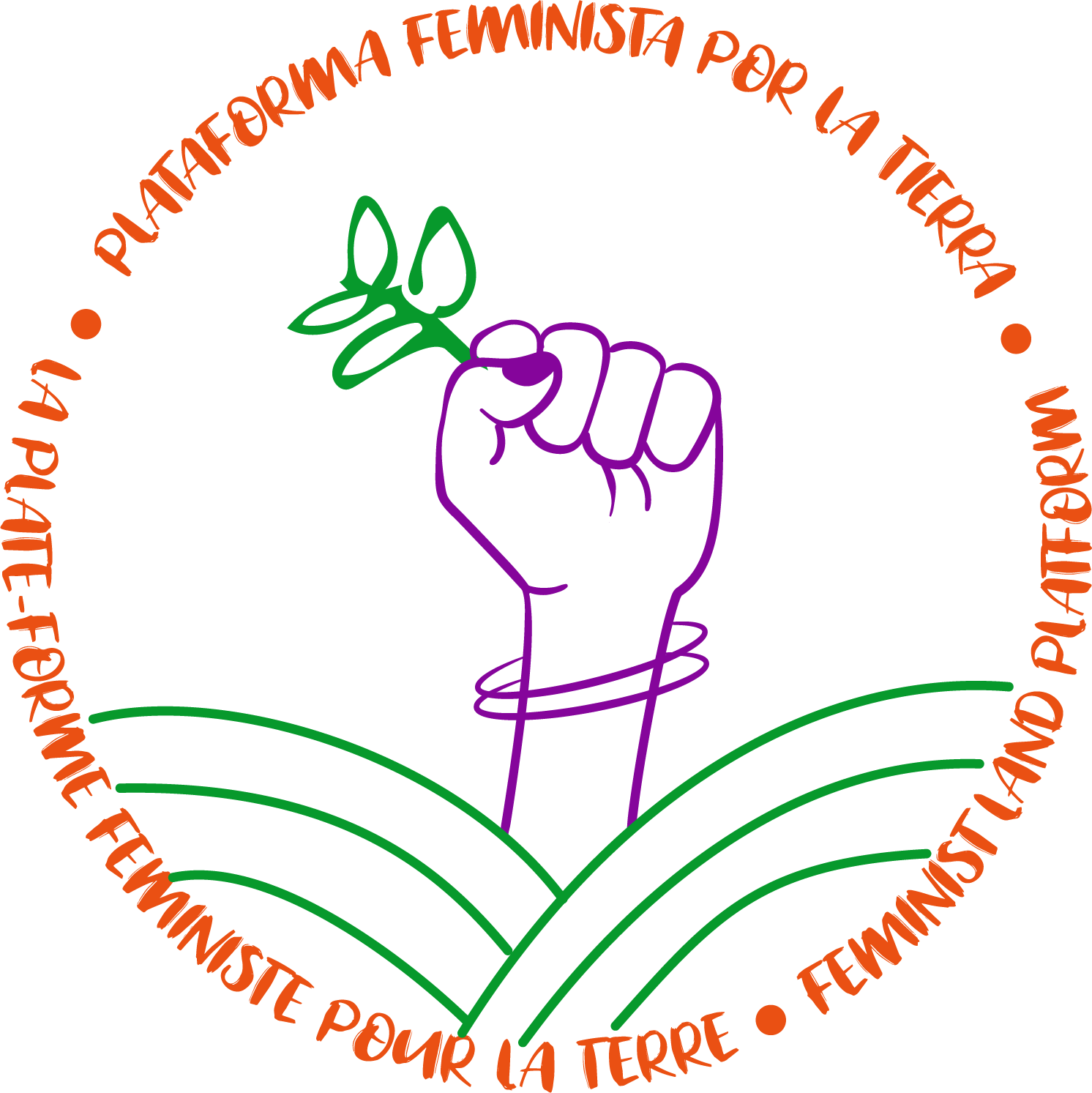There is a diversity of practices that show the richness of the territorial work carried out by the organisations that make up the Feminist Land Platform (FLP), a network of organisations that fight for women’s land rights in the Global South.
We’ve decided to map these practices to get a broader view of the work done in each territory and allow the other communities to learn and adapt tools and strategies to their local realities.
The best resilience practices that were mapped focus on four thematic areas:
a) Women’s rights to lands and territories (successful tools and processes);
b) Political training for women’s leadership;
c) Agroecology and forest, land and territory management and;
d) Safe access to water.
You can find below a visual representation of the thematic areas included in each organisation’s work, followed by more information about each of the thematic areas and a list of some of the practices.

Thematic areas
Agroecology
Agroecology has been applied in a variety of ways and it has proven to be a strong ally in managing forests, lands and territory. For instance, agroecological practices and seed wealth preservation allow for women of landowning and landless class food and seed sovereignty. Additionally, backyard urban gardens for self-consumption have reduced food insecurity in which people find themselves as a result of the loss of their livelihoods. The development and maintenance of urban gardens responds to contemporary needs: community strengthening, landscape improvement, urban habitability, leisure, environmental education, use of rainwater, and improvement of the economy and food autonomy. Agroecology efforts have been carried out by Fundación Plurales, Espaço Feminista, Luna Creciente, MUDECI, TIN HINAN, and UBINIG.
Right to land and territories
Women have fought to access their rights to land by using a variety of strategies to secure their ability to continue to strive and contribute to communities where they have chosen to live. These successful tools and processes involve accessing legal rights and building public policy that is culturally and gender sensitive and consonant with the relevance of historical processes of resistance. Initiatives include using technology to collect data that proves how long women have occupied their lands and dwellings, cases of expropriation, as well as collecting data that contributes to strengthening women’s security and autonomy in their territories. This thematic area has been implemented by five FLP organizations in Latin America (Fundación Plurales, Espaço Feminista) and Africa (Fórum Mulher, AZUL, and PWESCR).
Climate adaptation
Climate change has become a major threat to humanity. As a result, natural disasters, droughts, and shortage of natural resources have become commonplace globally. Though it has affected all countries, climate change has had greater impact on the poorest and most vulnerable. “The consequences of climate change now include, among others, intense droughts, water scarcity, severe fires, rising sea levels, flooding, melting polar ice, catastrophic storms and declining biodiversity[1].” Initiatives focused on safe access to water to address climate change have been carried out by Plurales, Luna Creciente, and TIN HINAN.
Advocacy
If one considers that every choice is political act, then political awareness is an essential tool for transforming the world. Political training is one of the main ways to promote discussions and understanding about differences aiming for equity. When taken towards promoting autonomy and empowerment of women in different aspects and levels it becomes one of the pillars of the feminisms emancipation processes. Political training for women´s leadership initiatives have been carried out by Plurales, Espaço Feminista, Luna Creciente, Fórum Mulher, and PWECR.
Governance
This thematic area is often derived from political training for women leaders. It allows for political visibility and perspective, from a general to particular contexts in communities. It targets actions to address violations by actors who contribute directly or indirectly to climate crisis and the damage to women’s territories and bodies. Hence, the most effective strategies to promote such governance is through the development of common intervention agendas which influence directly the ability of women to occupy positions of power. This allows them to make informed decisions that have positive impacts on their right to land and territory as well as increases their ability to address threats face as a result of climate change. Political participation of women – through the leadership they play in their communities and in the relationship that they establish with public authorities – is key to ensuring communal territory governance. The FLP organizations working on this issue include Espaço Feminista, Luna Creciente, TIN HINAN, and PWESCR.
[1] United Nations Climate Action. In https://www.un.org/en/climatechange/what-is-climate-change.
Best resilience practices
Country: Mali
Organisation: TIN HINAN MALI
Responsible person: Fadimata Walet ABDALAH.
Practice: Participation of the women of Banguikogho in the management of their forest area.
Country: Morocco
Organisation: AZUL
Responsible person: Amina AMHARECH
Practice: Application to collect cases of spoliation.
Country: Tanzania
Organisation: Pastoral Women’s Council Tanzania
Responsible person: Ruth Kihiu
Practice: Advancing the Land Rights of Indigenous Women in Northern Tanzania.
Country: Argentina
Organisation: Plurales Foundation
Responsible person: Marta Esber
Practices:
- Training at the Intersection of Environmental Justice and Gender.
- Access to Safe Water
- Reforestation and productive practice with the carob tree.
- Women Environmental Defenders Program.
Country: Brazil
Organisation: Espaço Feminista do Nordeste para Democracia e Direitos Humanos
Responsible person: Anamaria Melo and Natali Lacerda
Practices:
- Productive inclusion of agroecological basis – Strengthening the autonomy and identity of rural women: agroecology, food sovereignty and network of women producers.
- Feminist and anti-racist political formation – strengthening the identity and autonomy of women through formative processes and the strengthening of networks.
- Land regularization as a guarantee of women’s right to land – Strengthening safety and autonomy – individual and collective of women.
Country: Ecuador
Organisation: Movimiento Nacional de Mujeres Luna Creciente
Responsible person: Clara Merino
Practice: Political training for women’s organizations in Ecuador
Country: Mexico
Organisation: Mujeres, Democracia y Ciudadanía A.C
Responsible person: Elsa María Arroyo Hernández
Practice: Urban Agriculture Training Center
Country: Bangladesh
Organisation: UBINIG (Policy Research for Development Alternative)
Responsible person: Farida Akhter
Practice: Nayakrishi agroecological practices and Seed wealth preservation

No comment yet, add your voice below!